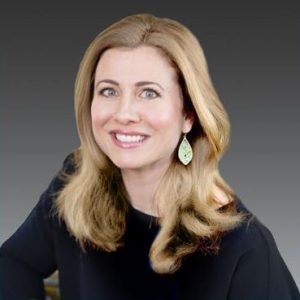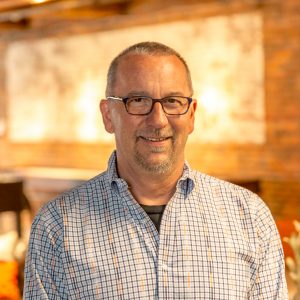
5 Questions with Danielle Kalkofen, Quality Control Scientist, Vigene Biosciences
“5 Questions With…” is a weekly BioBuzz series where we reach out to interesting people in the BioHealth Capital Region to share a little about themselves, their work, and maybe something completely unrelated. March is WOMEN’S HISTORY MONTH and BioBuzz will celebrate by featuring Women in the BioHealth industry all month, especially in “5 Questions With…”. This week we continue the series with Danielle Kalkofen, Quality Control Scientist, Vigene Biosciences.
Danielle Kalkofen is a molecular cell biologist and biochemist with 15 years of industry and academic experience. In 2015, she turned her focus to biological assay development, leading cross-functional teams to develop, validate, and commercialize new pathogen detection assay products. Then in 2019, Danielle moved into analytical assay development, where she works as part of a multidisciplinary team to create a portfolio of cGMP-compliant assays to aid in delivering consistent, high-quality viral-vector gene therapy products. Danielle holds a Ph.D. in Molecular and Cell Biology from Cornell University and a B.A. of Biochemistry and B.A. of Biology from St. Mary’s College of Maryland.
1. Please introduce yourself to our audience with a look back at your education and career.
First of all, thank you for this opportunity to participate in BioBuzz’s “5 Questions With” series. I am both thrilled and proud to be part of the vibrant BioHealth Capital Region community.
My education and career have developed in a somewhat organic fashion with my love of learning a driving force. As a child, I was fascinated with the natural world. I wanted to know how it all worked! This ultimately led me to pursue a career in science. What could be better than discovering new information and establishing new facts for a living?
My college education and early research opportunities in sphingolipid metabolism and Gaucher disease sparked my interest in the genetics and pathophysiology of metabolic diseases. During my post-undergraduate research at the NIH, I realized that I wanted to understand better the cellular mechanisms that went awry in these diseases. This pushed me to obtain my doctorate in molecular cell biology and biochemistry at Cornell University.
At the end of my doctoral work, I was ready to find a way to use my accumulated knowledge to benefit others. I entered into a joint-postdoctoral fellowship between the University of Maryland Baltimore and PathSensors to develop new cell-based biosensor assays for environmental pathogen and toxin detection. Within a year, I joined PathSensors as an assay development scientist, a role that greatly expanded my horizons beyond the bench. Not only did I develop and validate assays, but I interacted with clients and industry stakeholders to learn about their needs. I worked with different departments such as engineering, manufacturing, marketing, and business development to help create a new portfolio of products and get them to market. I enjoyed being part of such a highly cross-functional team and discovering that there were many ways I could use my training outside of the lab.
However, I still found myself drawn to metabolic diseases and their emerging gene therapy treatments. So, when an opportunity arose in 2019, I joined the Quality Control and Analytical Services department at Vigene Biosciences, a gene therapy CDMO.
2. You are currently a Quality Control Scientist with Vigene Biosciences. Walk us through your role and a typical day in your world.
As a QC Scientist, my job is to ensure Vigene’s consistently high-quality gene therapy products. This role’s core responsibility is to perform cGMP-compliant analytical testing to confirm the identity and characterize the potency and purity of the products. To accomplish this, my teammates and I use a variety of skills and wear multiple hats every day that goes far beyond routine sample testing.
We constantly develop and validate new assays as the field, technology, and regulatory guidelines evolve and address our clients’ specific needs. We provide extensive technical and scientific support to our internal manufacturing teams, business development group, and clients. We help ensure the appropriate tests and product specifications are selected, give data interpretation and recommendations, and furnish documentation for our clients’ regulatory filings. At any given point we are supporting about 10-15 different active projects in various stages from process development to routine cGMP manufacturing. It’s a fast-paced but rewarding environment, to say the least!
3. Vigene is growing and recently announced an expansion leading to nearly 250 new jobs. Talk about what it’s like working for a growing company here in the BioHealth Capital Region and what this expansion means.
In the short time since I joined Vigene, we’ve doubled our workforce and more than doubled our production space. With our new commercialization facility opening, we’ve expanded our production space by over 60%. By 2025, we’ll double our workforce again as we bring our new facility online. Needless to say, we are experiencing tremendous growth, so it’s an exciting time for us.
Our steady growth is due to the rapidly growing demand for cell and gene therapy products. From 2012 to 2017, there were over 2,000 cell and gene therapies undergoing clinical trials worldwide, and currently, there are approximately 20 products on the market. By 2025 the FDA expects to approve up to 20 new cell and gene therapy products per year. And it is estimated that the global gene therapy market will grow at nearly 30% annually for the next several years.
While some have stated this to be overly optimistic, there is no question that the industry is burgeoning. This newest expansion of our manufacturing space and talent will allow us to better serve and support more clients, drive process innovation that will make production more efficient, and lower cost barriers. This will ultimately help achieve our goal of making cell and gene therapy affordable for everyone and get much-needed life-saving treatments to patients.
4. Gene Therapy has been a hot topic in the past few years. What is something that most people don’t know about it that they should?
The idea of gene therapy was conceived in the 1960s, and the first gene therapy clinical trial started in the late ’80s. But for all of the decades of cutting-edge research and development, gene therapy is still an emerging treatment. There is still much we don’t know about the biology. There is a lot of room for technological innovation to make safer and more efficient vectors and streamline and optimize manufacturing processes to create consistently high-quality products.
Given the novelty of gene therapy, the regulatory waters are still a bit murky. Altogether, some may find this discouraging, but I think it’s especially inspiring. It’s an extraordinary chance to grow in an industry where I know that my contributions can make a difference. We have only scratched the surface of gene therapy’s potential, and I can’t wait to see what the next 10 to 20 years will bring.
5. What’s the most interesting thing you’ve read or seen recently? Tell us about it.
I have an interest in herbalism, aromatherapy, and cosmetic formulation. I spend a lot of my leisure time researching it and experimenting with different cosmetic preparations. While I enjoy learning about herbalism’s historical and cultural aspects, I “geek out” when I come across scientific studies and texts.
A fascinating book I read recently is called “The Chemistry of Aromatherapeutic Oils” by E. Joy Bowles. The book discusses chemical constituents documented in various plant extracts and what is known about their pharmacological effects on human neurobiology and behavior. Yes, it’s nerdy, but it’s fun to know the science behind why the scent of lavender makes me feel so relaxed!
Thank you Danielle Kalkofen, Quality Control Scientist, Vigene Biosciences. for participating in the ‘5 Questions with BioBuzz’ series, and stay tuned for more interviews with others from across the BioHealth Capital Region and beyond.




